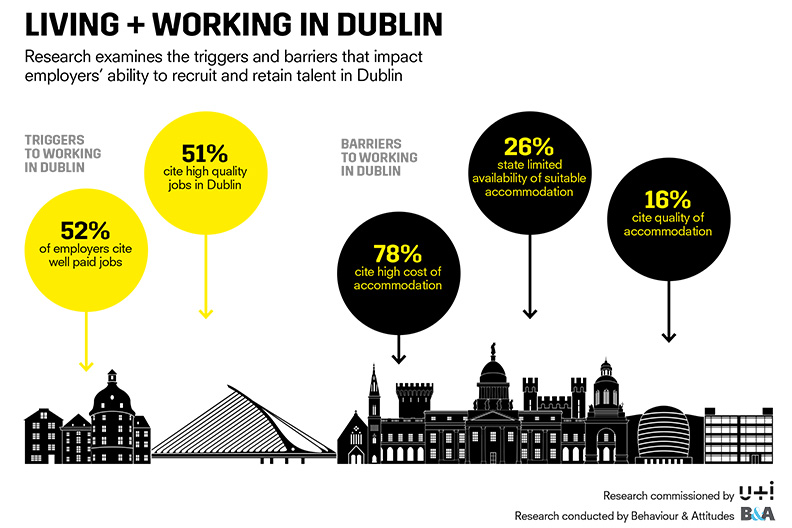Housing availability, recruitment and retention in Dublin
New research commissioned by specialist regeneration and property developer U+I shows that Dublin's housing crisis is seriously hampering business' efforts to recruit and retain talent in the city.
The 'Housing availability, recruitment and retention in Dublin' research, conducted by Behaviour & Attitudes, surveyed more than 100 senior hiring managers representing large national and international employers in Dublin. Despite a majority saying that well paid, high-quality jobs are the main attraction to working and living in Dublin, 78% of respondents said the high cost of accommodation is the single greatest obstacle in attracting talent to the city.
Three quarters of those surveyed also said that the limited availability of accommodation is hindering their efforts to recruit, as many young professionals and single middle-income earners are priced out of the Dublin market. This new research quantifies for the first time the challenges posed by the housing crisis to Dublin's position as an attractive location for international talent.
These findings are even more stark when considered alongside the research compiled by Amárach Research which found that the centre of Dublin is at risk of being 'hollowed out' accessible only to high earners at the expense of younger people, single person households and middle-income earners.
Following the publication of the research results, U+I chief executive Matthew Weiner said:
"We have seen much discussion in the media about the impact a shortage of the right kind of homes in the right locations is having on recruitment. This research provides hard evidence that this is a reality for employers. This is a real concern as attracting and retaining talent is the number one issue. Diversity, next generation talent and creativity are essential ingredients for a thriving modern city and the housing market needs to adapt and respond to ensure that Dublin maintains a competitive labour market and vibrant culture.
Matthew Weiner continued:
"The results of this research and other reports we have recently commissioned show, quite clearly, that consumer and lifestyle habits are changing. Young people in particular are living increasingly compact, experientially driven lives, looking to live and work in city centres. U+I has worked on a number of intelligently designed living solutions for housing and community focused mixed-use projects and its Compact Living model is one such example. These purpose-built, self-contained, rental-only homes have been designed to maximise available space and cater the needs of single person households.
Compact living is just one example of a broader suite of solutions, alongside thoughtful mixed-use regeneration, which we believe is required to tackle the housing supply challenges Dublin faces. Ideally, we would like to develop these types of innovative housing solutions on sites in association with public sector bodies, who have unused and underdeveloped land in Dublin City Centre. Such partnerships could release significant value for the public purse and provide housing options that are so urgently needed."
This article was originally published on 24th September 2018 by U+I.
--U and I
[edit] Related articles on Designing Buildings Wiki
Featured articles and news
What they are, how they work and why they are popular in many countries.
Plastic, recycling and its symbol
Student competition winning, M.C.Esher inspired Möbius strip design symbolising continuity within a finite entity.
Do you take the lead in a circular construction economy?
Help us develop and expand this wiki as a resource for academia and industry alike.
Warm Homes Plan Workforce Taskforce
Risks of undermining UK’s energy transition due to lack of electrotechnical industry representation, says ECA.
Cost Optimal Domestic Electrification CODE
Modelling retrofits only on costs that directly impact the consumer: upfront cost of equipment, energy costs and maintenance costs.
The Warm Homes Plan details released
What's new and what is not, with industry reactions.
Could AI and VR cause an increase the value of heritage?
The Orange book: 2026 Amendment 4 to BS 7671:2018
ECA welcomes IET and BSI content sign off.
How neural technologies could transform the design future
Enhancing legacy parametric engines, offering novel ways to explore solutions and generate geometry.
Key AI related terms to be aware of
With explanations from the UK government and other bodies.
From QS to further education teacher
Applying real world skills with the next generation.
A guide on how children can use LEGO to mirror real engineering processes.
Data infrastructure for next-generation materials science
Research Data Express to automate data processing and create AI-ready datasets for materials research.
Wired for the Future with ECA; powering skills and progress
ECA South Wales Business Day 2025, a day to remember.
AI for the conservation professional
A level of sophistication previously reserved for science fiction.
Biomass harvested in cycles of less than ten years.
An interview with the new CIAT President
Usman Yaqub BSc (Hons) PCIAT MFPWS.
Cost benefit model report of building safety regime in Wales
Proposed policy option costs for design and construction stage of the new building safety regime in Wales.
Do you receive our free biweekly newsletter?
If not you can sign up to receive it in your mailbox here.



























Comments
that is why i left Dublin